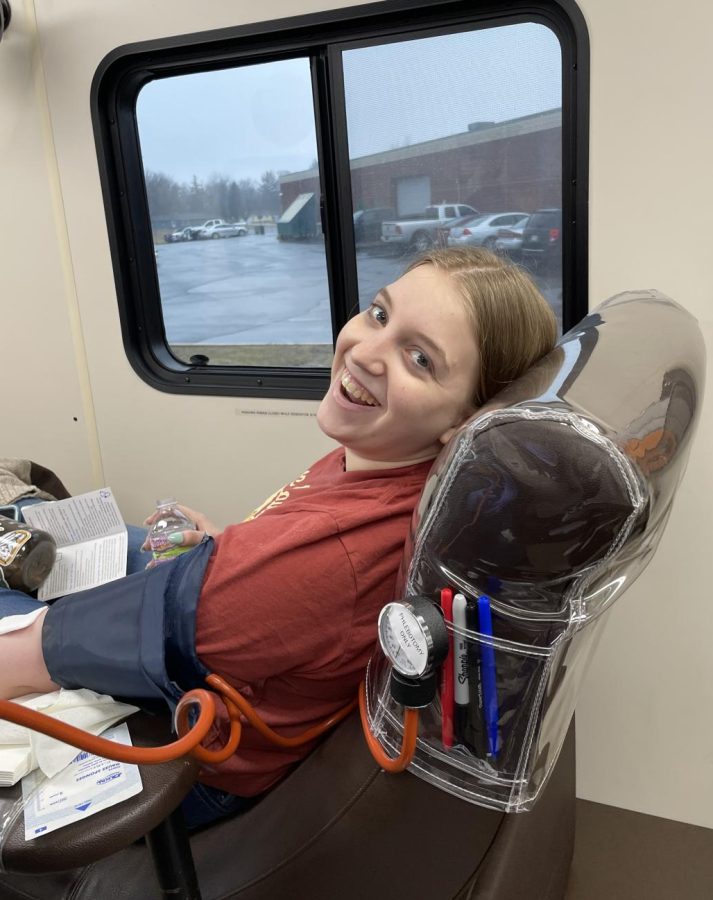Blood drive collects five gallons of blood
April 12, 2022
As someone with a long history of being afraid of needles, I was adamant on not giving blood. The thought of watching a needle puncture my arm and extract my blood through a plastic tube was nauseating. It was not until a few weeks of persuasion later that I finally decided to face my fear and do it. My experience was not at all what I expected it to be, as it was genuinely one of the easiest things I have ever done. Donating blood can be a scary thing, but at the end of the day saving lives is quite the reward.
On Monday, April 4, senior Alexa Fleegal hosted a blood drive at Berlin High School. Fleegal decided to organize a blood drive to fill the requirements for her gallon grad challenge. Now, she gets a red cord around her neck at graduation due to the fact that she not only donated a minimum of three times herself, but she also got a total of 56 participants to sign up for the blood drive that was held.
“I feel like donating blood is one of those things that everyone knows there’s a shortage, but not everyone is willing to do it so I wanted to bring awareness. I thought it was good to get students to start to donate because then they’ll be more likely to donate in the future,” Fleegal said.
Despite putting in plenty of time to organize the drive, Fleegal was not the only one that helped make this possible. Community Blood Center Account Manager Lisa Koeppen assisted in the organization as well.
“We need at least three months to plan a blood drive. With the Account Manager at The Community Blood Center you will pick a day, time and place that you will work together to determine to be the best for your blood drive,” Koeppen said. “You will also talk about where the donors will come from. You do not just set up a blood drive, you need to recruit donors to come to your blood drive. We provide posters, table tents and online tools. The most important thing is to ask donors personally to come to your blood drive.”
Despite the 56 people that signed up to donate blood, only 39 were actually eligible. For senior Erica Jones, the current antibiotic she is using for her infected sunburn made her ineligible to donate.
“I have a swollen lymph gland and an infection. I’m making an off-balance of white blood cells so that could be harmful to whoever I’m donating to or to me,” Jones said.
However, many students, teachers and community members were still able to donate, the grand total being just a half pint away from five gallons. Whether it was for personal reasons, or simply to help end the shortage, many students like senior Allie Borland decided to become first time donors.
“I was in the hospital a lot as a kid and I think it’s very important that everyone gets medical care,” Borland said.
Along with the donated pint of blood, donors also get a little bit of blood put into different vials which will be sent into a lab to be tested. This process allows first time donors to find out their blood type.
“We run about 20-something tests on each blood donor. If anything comes back at all we have nurses and doctors on staff that call our donors,” phlebotomist Teresa Schuster said.
Accompanying the national blood shortage, there is also a national hesitancy around donating blood. For many, the idea is quite frightening. Phlebotomist Ashley Hermans gives advice to those who are considering donating.
“It’s 100% a mental game. It’s kind of like sports in that sense where if you think you’re not going to do so well in the game or when you’re donating, you’re probably not going to but as long as you stay calm and think happy thoughts, it’s really not too bad. It’s all about preparation like drinking a lot of water beforehand and eating a good meal and not freaking yourself out,” Hermans said.
The pre-donation screening process is not only short, but quite simple as well.
“Once they get here they go into the screening room and do a mini physical, so they’re going to get a little finger poke to test their iron. They’re also going to get a temperature, blood pressure, and a pulse check. Then they come out into the chair and we get them all prepped up for their donation of a pint,” Schuster said.
There are many unsettling statistics surrounding the idea of donating blood, as donations are needed now more than ever.
“Less than 10% of the population donates. Currently we have a national shortage, so if you have never donated blood I encourage you to donate. You are truly saving a life,” Koeppen said.











